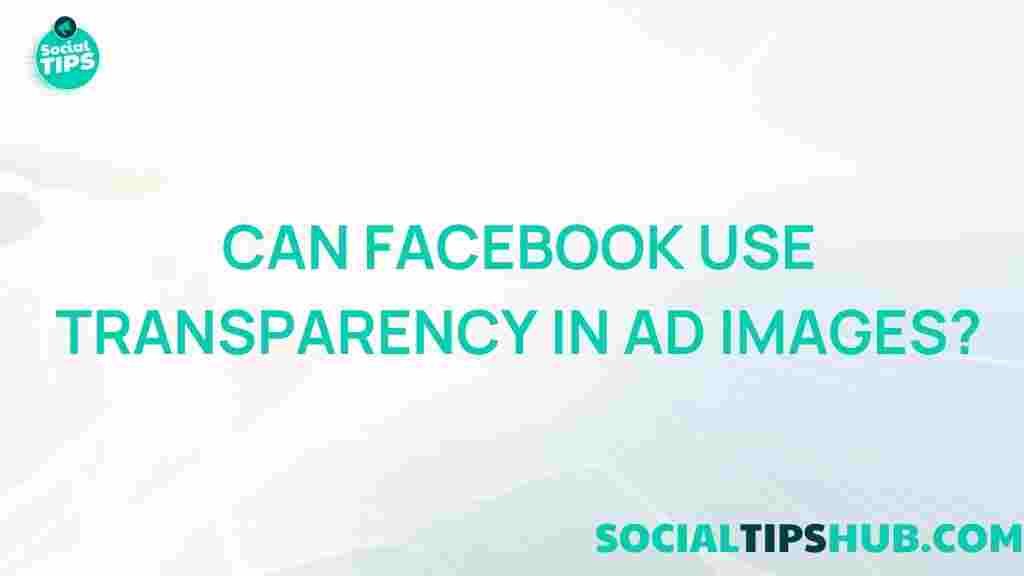Unveiling the Power of Transparency in Facebook Ad Images
In the fast-paced world of digital marketing, Facebook has emerged as a dominant platform for advertisers. With billions of users worldwide, the potential to reach diverse audiences is unmatched. However, the effectiveness of advertising on Facebook depends significantly on the quality of ad images used. One crucial aspect that marketers often overlook is the power of transparency in these images. This article explores the importance of transparency in Facebook ad images, how it influences user perception, and best practices for implementation.
Understanding Transparency in Facebook Ad Images
Transparency in advertising refers to the clarity and honesty with which a brand communicates its message. When it comes to Facebook, transparent ad images can significantly impact user engagement and trust. Here are a few key points to consider:
- Authenticity: Users are more likely to engage with ads that feel real and relatable.
- Trust: Transparent images foster a sense of trust between the brand and the audience.
- Brand Reputation: Brands that maintain transparency are often perceived more positively, enhancing their reputation.
The Role of Transparency in Facebook Advertising
Transparency plays a crucial role in how users interact with Facebook ads. Here’s a deeper dive into its effects:
1. Building Trust with the Audience
When users feel they can trust a brand, they are more likely to convert. Trust can be established through:
- Realistic Imagery: Use images that depict real people and real situations.
- Consistent Messaging: Ensure the ad images align with your overall brand message.
- Clear Branding: Your brand should be visible in the ad image to enhance recognition.
2. Enhancing User Engagement
Transparency encourages user engagement. Ads that are honest and straightforward can drive higher interaction rates. Consider these strategies:
- Use of User-Generated Content: Showcase images from actual customers using your products.
- Behind-the-Scenes Visuals: Share images of your team or processes to humanize your brand.
- Authentic Storytelling: Use images that tell a story, resonating with your audience’s emotions.
3. Increasing Conversion Rates
Ultimately, the goal of any advertisement is conversion. Transparent images can help achieve this by:
- Setting Realistic Expectations: Avoid misleading images that may create false expectations.
- Highlighting Benefits: Use images that clearly showcase the benefits of your product or service.
- Encouraging Action: Clear calls to action in your images can guide users towards conversion.
Step-by-Step Process for Creating Transparent Facebook Ad Images
Creating transparent Facebook ad images involves several steps. Follow this guide to enhance your ad campaigns:
Step 1: Define Your Audience
Understanding your audience is crucial. Consider the following:
- Demographics: Age, gender, location, and interests.
- Psychographics: Values, attitudes, and lifestyle.
Step 2: Select Authentic Imagery
Choose images that resonate with your audience. This could include:
- Images of real customers using your product.
- Behind-the-scenes photos of your team or processes.
- Visuals that represent your brand values and mission.
Step 3: Maintain Consistency in Branding
Your ad images should consistently reflect your brand identity. Focus on:
- Color schemes that align with your brand.
- Consistent logo placement in all images.
- A unified style that reflects your brand personality.
Step 4: Test Your Ad Images
Testing is essential for understanding what works. Implement A/B testing by:
- Creating multiple versions of your ad with different images.
- Analyzing performance metrics to identify the best-performing images.
Troubleshooting Tips for Facebook Ad Images
Even with careful planning, issues may arise. Here are some troubleshooting tips for common problems:
1. Low Engagement Rates
If your ads aren’t getting the engagement you hoped for, consider:
- Are the images relevant to your audience?
- Is the message clear and concise?
- Are you using high-quality visuals?
2. Negative Feedback
Negative comments can affect your brand’s reputation. Address this by:
- Monitoring comments and responding promptly.
- Assessing whether the images are misleading or unclear.
- Adjusting your strategy based on feedback.
3. Ad Rejections
Sometimes, Facebook may reject your ads. To avoid this:
- Ensure your images comply with Facebook’s advertising policies.
- Avoid using prohibited content in your images.
- Check the image resolution and format requirements.
Conclusion
In conclusion, the power of transparency in Facebook ad images cannot be underestimated. By focusing on authenticity, building trust, and enhancing user engagement, brands can significantly improve their advertising effectiveness. Implementing the strategies outlined in this article will help you create compelling ad images that resonate with your audience, driving better results.
For more insights on effective advertising strategies, check out this comprehensive guide on digital marketing. If you’re looking to learn more about Facebook advertising, feel free to visit Facebook’s official resources for up-to-date information.
This article is in the category News and created by SociaTips Team
